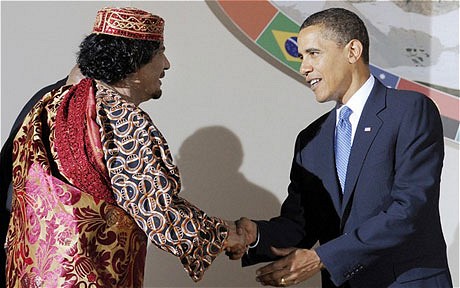It would not be surprising if there are many in the Obama Administration who occasionally think, “I miss Moammar Gaddhafi.” And if no one there is thinking that, they should. And not just because of the camping trips he would take in New York City, his amazing sense of style, his elite unit of all-female bodyguards, or his obsession with Condoleezza Rice (culminating in a video tribute to her, complete with an original song entitled, “Black Flower in the White House“). It turns out that the U.S. led (from behind) intervention in Libya may have been an enormous tactical error for the Obama Administration—a mistake which continues to haunt the world to this day:
NATO’s “light footprint” strategy succeeded in ousting Gaddhafi, but left no one on the ground to restore order in the aftermath. This was exacerbated by the fact that Libya was already a country with little infrastructure, and the invasion destroyed what little there was (not to mention the thousands of Libyans who were killed in order to usher in this dystopia). As a result, nearly two years later, large swaths of the country remain ungoverned, and bands of heavily-armed militias roam the countryside with impunity. This was driven home forcefully in the 9/11/12 attacks on the US Consulate in Benghazi, which resulted in the death of US Ambassador Chris Stevens. This consulate attack (which the White House falsely attributed to protesters who were angry about an anti-Islam video) would prove a thorn in the Administration’s side, domestically—resulting in Susan Rice being blackballed for Secretary of State, and leading to a filibuster of Chuck Hagel’s nomination for Secretary of Defense. And there is no sign that the Republicans are going to drop it in the near future.
More significantly, the Libya intervention gave al-Qaeda a foothold back into the “Arab Spring.” Prior to the NATO intervention, the protests had been largely peaceful, and al-Qaeda had been driven to the sidelines of the revolutions they had been fighting to realize for decades. However, the US actions in Libya ceded the narrative back to al-Qaeda, that dictators had to be overthrown by force. Accordingly, al-Qaeda affiliates were among the first forces on the ground to “assist” the NATO mission in Libya. AQIM has since expanded their territory, conquering a huge swath of Northern Mali, prompting a French intervention of unspecified length in their former colony. This, in turn, led to a spread of militancy in Algeria, resulting in the deaths of scores of foreign nationals from around the world.
Al-Qaeda affiliates were among the primary recipients of the weaponry, supplies, and training provided to the Libyan rebels. Those very weapons have since reappeared in Syria, where al-Qaeda and their affiliates represent the most effective forces among rebel fighters; and their recruitment is soaring, as a result. The militants have continued to receive arms and supplies, now being provided to the rebels in Syria—made evident by the October 2012 failed terror attack in Jordan with weapons provided to said rebels.
And while the Libya intervention empowered al-Qaeda to intervene in Syria, it hamstrung the US from doing the same. NATO’s actions were widely perceived to be an overreach of the UNSC Chapter 7 Resolution which was used as a legal pretext for the intervention. This led Russia and China to block US efforts to pass a similar resolution on Syria, which according to Susan Rice, “forced” the U.S. to go around the U.N. in order to achieve their aims in Syria. In this, they have been disastrously unsuccessful. Despite their incessant claims that Bashar al-Asad’s fall was imminent and inevitable, two years after the beginning of the protests, his position remains relatively secure, and the rebels are running on fumes.
Finally, there are the semiotics of the intervention. For all of his insanity, his crimes, his corruption, and his outrageous posturing– under the Bush (II) Administration, Moammar Gaddhafi became a partner of the United States in counter-terrorism efforts, and in nuclear non-proliferation. To ask Gaddhafi to abandon his nuclear weapons program, and then subsequently drive him from power—this sends the wrong message to countries such as North Korea or Iran. It seems as though nuclear weapons may be a successful deterrent to direct U.S. aggression, and that cooperation with America is a great way to get thrown under the bus.
The Obama Administration clearly viewed the ousting of Gaddhafi as a mere speed-bump in their larger “Arab Spring” strategy (such as it is)—and in many ways, he was. But he put up a much stronger fight than NATO was expecting, and the aftermath of the invasion has been absolutely crippling for US foreign policy. If Gaddhafi is rolling in his unmarked grave, it is probably with laughter.

